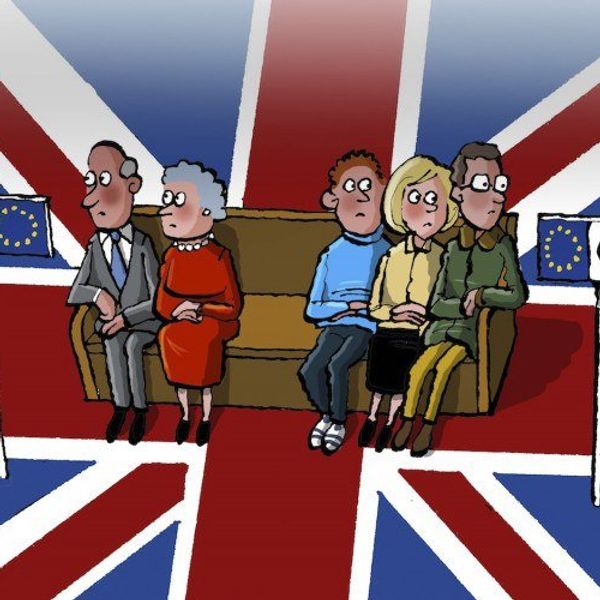Sovereignty.
It is a word that seems to be in the process of being forgotten in this modern era, yet it is a word that is vital for continuing the cause of liberty. It is the reason the United Kingdom voted to leave the European Union last Thursday.
For those who don’t know, the battle for the sovereignty of the United Kingdom has been coming to a head for the last several months. It was a battle with two main, obvious factions: the “leave” camp and the “remain” camp. Each side had their own arguments as to why theirs should be the victor with the main topics being about the future of the nation’s economy, immigration, and the return of legislative powers to Parliament which would no longer have to be approved by lawmakers in Brussels.
To see why the UK leaving the EU is an important step in the right direction, it is necessary to fully understand both sides of the argument without the emotional and unhelpful points of the leave campaign simply being racist or xenophobic or hateful. While these emotional aspects of the arguments cannot simply be ignored, I want to focus on the logical parts of the debate. Logic must always trump emotion when it comes to major world decisions such as this was.
So, let us begin.
One of the main talking points for the remain campaign involved the economy. They claimed that leaving the EU would affect the UK economy in a negative way, bringing with it long-term recession and possibly depression since they would have to negotiate trade deals with every country in the world that they wished to trade with. If you know any history, you know how important trade is for an island nation like the UK, so looking at this point initially, you might think this is a solid argument and reasonable enough to support Britain staying in the EU if you’re a British citizen.
But there is little to no proof that the EU benefits the UK’s economy in such a significant manner to where leaving would be terribly damaging in the long run. In fact, according to a classification list produced by the World Bank every year in which they rank countries based on their GDP, in 1972, a year before the United Kingdom became a member of the European Union, Britain was the fifth richest country in the entire world. For much of their run with the EU, they remained fifth. Indeed, only between the years 1999 to 2004 did the UK manage to rise up a notch and become the fourth richest country, only to jump back down to fifth in 2005 and then sixth in 2008 where it remained until 2013. In 2014 Britain jumped back up to fifth place.
With this data, accessible with a quick Google search, it is incredible that anyone at all could believe this argument made by the remain camp, since all the data seems to show that the UK remained where they were economically for almost their entire membership with the EU. A quick data summary of the UK’s GDP growth since 1955 provided by The Guardian shows that, ever since they joined the EU, growth was more or less the same as it was before British membership—though, there was a more consistent growth pattern during the 1980s. It is true to say that the UK’s economy has become much bigger since they joined the European Union, but that does not mean the EU is the one to thank for this, since almost every single country’s economy has grown in the last forty years thanks to the creation of new technologies which led to new industries which led to growth. Correlation does not equal causation.
It is true to say that the UK economy will take a hit from leaving the EU, only if you are talking about the short term, as we saw with the huge drop the pound-stirling took. Hard times will most likely come for the British people because of this decision, especially if they continue taking the wrong steps toward a more socialized style of trade, business, and industry. If they actively seek to create free trade agreements with other free nations, however, as Nigel Farage, the leader of the leave campaign, said the UK wishes to do Tuesday in front of the European Parliament, then Britain will come back swinging from whatever recession or economic down they hit in the long run and there will be more potential for prosperity than the EU could ever offer any of its members.
There are many more things that could be said about the future of the British economy now that Brexit has won (in fact, I could write a whole article on this topic alone and it would still be super long) but the basic facts should suffice, and that is that the UK never needed the EU economically. They were a powerhouse economy before joining the EU, they will be once again in the long run now that they have left it.
A second talking point the remain campaign issued during the debate was, essentially, that the unknown future should be avoided.
My question to that is: “why?”
Why is that a reason to not fight for liberty? Why is that a reason to continue to allow a nation’s sovereignty to be taken from them by unelected bureaucrats? Isn’t the attitude the left always encourages to fight the power of authority? It sure used to be, but I guess when the authority is their own, the attitude is much less appreciated.
The point is, fear of the unknown is not a legitimate reason to not do something great—in this case, to vote for liberty, for a people’s right to govern themselves. Sure, it’s hard. Sure, there’s always a chance of failure; but if fear of the unknown was allowed to be such a prevalent reason to stop from the beginning, there would have been no D-day landing in Normandy during WWII. There would be no American Revolution. There would be no sailing for Columbus and no discovery of the New World. There would be no Age of Enlightenment and Reason. It should not be an excuse to scare people out of seeking liberty for themselves.
A third talking point is that Britain leaving the European Union makes Europe weaker and thus the threat of Russia becoming aggressive more real. I will address this one quickly. No, it does not. The EU is not NATO, the alliance system that is actually in charge of safeguarding Europe from any conflicts they may face from an enemy. The UK is still part of NATO, thus Europe’s military capabilities have not changed, so, honestly, quit your fear-mongering about that.
A fourth talking point is that British citizens would begin to need visas to travel to other European nations. This point is true, even the leave campaign admits it, and while it is a hassle to do that, let us keep in mind that the UK is literally a little over twenty-one miles away from mainland Europe at its closest point. Getting a visa, while an extra step, should not be too hard since all the European nations will still be great friends with each other once the initial shock of leaving passes. The act of crossing the English channel to enter mainland Europe, will be no more difficult just because British citizens have to get a visa now. In the end, the same point I made with talking point #2 applies to this one. Discomfort (and this I consider to be a very minor discomfort) should not be an excuse to deny the people the right to govern themselves and to be sovereign.
These are the big talking points the remain camp gave as to why Britain should have stayed with the EU, but now let’s look at some of the more emotional arguments that have been made since the vote (ones that I personally find ridiculous, ludicrous, revolting, you name it) and debunk them quickly.
First, let me remind you that emotional arguments have no value in a debate where the outcome has repercussions for a multitude of people; in fact, emotional decisions should be avoided whenever possible. You usually never do something that you do not regret later when you do it in a state of anger or fear or even happiness. Logic must prevail in these situations, as anyone who has read Socrates should know; and for Brexit, the side with the most logic happened to be the leave campaign (which is why they won despite the media, multiple party leaders, and much of the progressive world opposing it). Second, calling an entire group of voters racists xenophobes who hate all people who do not look like them, is not a winning argument in any shape or form. In fact, it just shows that the left are sore losers and if you do not agree with them, they will try to belittle you, insult you, and discredit you. However, anyone with the powerful weapon that is logic should know that just because they scream racism, xenophobia, and hate at the top of their lungs does not make it true.
The ability for a nation’s elected legislators to make and pass their own laws, for a nation to control their own borders, for a people to govern themselves is necessary for any nation to function. Otherwise, you lose liberty. You lose your rights to live your own life. The fight for the United Kingdom to leave the European Union was one of sovereignty, and thus should be celebrated by all Americans who actually believe in our own founding principle of liberty. With this huge step in the right direction, Britain has shown the world that the fight for a people to govern themselves is truly a never-ending battle. And if the British seek to end the regulations imposed upon them by unelected lawmakers in Brussels, if they actively pursue free trade, if they continue taking steps in the right direction, they will show the world that the fight for liberty is truly worthwhile in the long run.






















